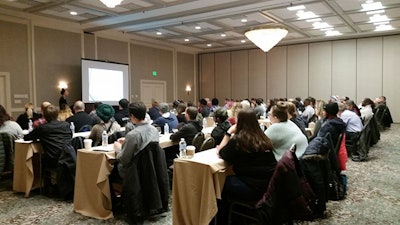
Last week, we examined how dispensary owners can optimize their business in states that have operated legal marijuana markets for at least a few years. Now, we move forward on the timeline and offer some perspective to dispensary owners who are in their first or second year of operation in newly legal marijuana markets. In this piece, we see a professional and cultural distinction forming between East Coast dispensaries and West Coast dispensaries. As more states open up dispensary markets east of the Mississippi, salary enticements are forcing owners to think fast and keep stiff competition in mind.
The main reason? Newer dispensaries need experienced employees, and often in new markets the candidate pool is shallow. A dispensary owner might have to perform a nationwide search, and then incentivize the top candidates to relocate, which can be tricky.
“A big deal is salary,” HempStaff’s owner James Yagielo says. “If [owners] give us a salary that we know nobody is going to move out there for, we just flat-out tell a client that that salary is not going to work if you want an experienced manager.
“There are a few routes people have gone. Some say, ‘I don’t want someone with cannabis experience. Give me someone who used to work in a pharmacy,’ so that they can find a local person. That’s one option. That really only works, though, if an owner has been in the cannabis industry. You really need at least one person who knows the cannabis industry.”
An experienced manager employing knowledgeable budtenders is a vital backbone to any successful dispensary. As talent is enticed to move across the country, competitive salaries will rise industry-wide. The effect is, generally speaking, a higher-paying and more structured and enticing corporate environment in newer East Coast dispensaries. Yagielo says he’s seeing this trend consistently, and its paramount that owners on both sides of the country keep up with the pace.
The salary question is even more important given the varying degrees of cannabis legality throughout the country and how relocating might affect an employee’s personal use. “A lot of times you’re asking someone to come from an adult-use recreational state to a non-adult-use recreational state,” Yagielo says. “So, if they enjoy cannabis and they don’t have a medical condition that those states approve, they’re going to be a little more hesitant to move to a state where they may have to go back on the black market.”
As more states come online with legal marijuana markets, those concerns will fade. In their place, one will see more pronounced best practices and a more refined approach to business culture.
Again, as we mentioned in part one of this three-part series, the overall trend from “head shop”-style dispensary to a more pharmacy-oriented aesthetic is already visible throughout the industry. Consumers of all demographics have made clear their overall preferences for cleaner, sleeker, more professional dispensaries. One way to be more professional? Avoid nepotism. Doing so can make a dispensary more professional and reduce turnover.
“Those that hire family and friends are generally looking for new employees in the first three months,” Yagielo says, “as working in a dispensary is not as fun as people think it will be – especially in a medical dispensary where you are dealing with sick patients all day.”
Yagielo says he sees nepotism declining, but as a result, owners are now taking on too much. “We’re seeing a lot of owners thinking they’re going to be the manager, and as soon as they open, ‘No, I need someone else in here; this is taking up 12 hours of my day everyday.’”
But sifting through resumes can take up just as much of an owner’s time. To ease the burden of managing the untold number of interested cannabis-industry prospects, HempStaff offers a helpful recruiting service. Around the country, HempStaff’s recruiters are waiting to help connect the company’s 32,000 potential candidates with dispensary owners.
“Our recruiters will do a pre-screening to make sure [the candidates] actually do meet all the requirements,” Yagielo says. “If they do, then we collect around five resumes. Send them to client. They can then let us know who they want to interview. We set up all the phone interviews on a conference line, we arrange all the in-person interviews. When they’re ready, they give us the offer letter. We run a background check. Once they start the first day of work, we invoice them. “
HempStaff’s next training sessions will be held in Orlando (Feb. 10); Palm Beach Gardens, Fla. (Feb. 11) and Detroit (Feb. 24). See a full list of training sessions and all registration information at hempstaff.com.
Next week, we’ll look at how HempStaff approaches hopeful dispensary owners navigate the often-complicated process of state applications.
Read Part 1 here
Read Part 3 here
Top photo courtesy of HempStaff


























